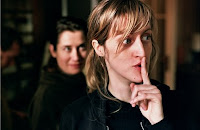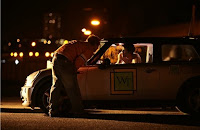IFFR Films (The good ones first...)
Here are the descriptions of the movies I saw. I used the official descriptions of the festival en added my comment ... sometimes.
Troubled Water (NO/SE 115')
 Jan Thomas has just been released from prison, where he served eight years for murdering a child. He finds a job as an organist in the church, where he becomes involved in a relationship with the pastor Anna. She is the single mother of Jens, an eight-year-old boy who has a stunning likeness to the boy whom Jan Thomas is supposed to have killed eight years ago. The chance of making up with a loving father role is jeopardized when Jan Thomas is recognized by the mother of the victim. Then Poppe shows the viewpoint of the mother still dogged by grief (a fantastic Dyrholm), who has now adopted two girls with her husband. She starts stalking Jan Thomas.
Jan Thomas has just been released from prison, where he served eight years for murdering a child. He finds a job as an organist in the church, where he becomes involved in a relationship with the pastor Anna. She is the single mother of Jens, an eight-year-old boy who has a stunning likeness to the boy whom Jan Thomas is supposed to have killed eight years ago. The chance of making up with a loving father role is jeopardized when Jan Thomas is recognized by the mother of the victim. Then Poppe shows the viewpoint of the mother still dogged by grief (a fantastic Dyrholm), who has now adopted two girls with her husband. She starts stalking Jan Thomas.Frozen River (US 97')
 When she gets up one morning just before Christmas, Ray discovers that she is a single mother. Her husband, a gambling addict and Mohican Indian, has run off with the down-payment on their new mobile home. Ray sends the children to school and says that she is not even going to go and look for her husband. But she does anyway.
When she gets up one morning just before Christmas, Ray discovers that she is a single mother. Her husband, a gambling addict and Mohican Indian, has run off with the down-payment on their new mobile home. Ray sends the children to school and says that she is not even going to go and look for her husband. But she does anyway.In the Mohican reservation, she finds his car just as it's being stolen by the Mohican Lila Littlewolf, but she doesn't find her husband. Ray is all on her own and a new mobile home seems impossibly distant. A strange twist of fate is that Lila, the car thief, offers a solution. Ray and Lila can smuggle illegal immigrants over the river between Canada and the United States. The loopholes in the law of the reservation are big enough for that, even though it's not without risk.
Frozen River is effective thanks to its grim social realism, but the power of the film is in the casting of the actress Melissa Leo, who plays a stubborn woman branded by life. When she shoots a hole in Littlewolf's mobile home, she's just as convincing as when she serves popcorn for breakfast. The film won the prestigious Grand Jury Prize at the 2008 Sundance Film Festival.
Fixer: The Taking of Ajmal Naqshbandi (US 84')
 A reporter who comes to a foreign country, seldom speaks the language and is often unfamiliar with the culture. Even for an experienced journalist, it is difficult to understand the finer points of local morals. For that, one has the so-called fixers. Often they are also journalists who literally and figuratively know their way around and know when something is wrong.
A reporter who comes to a foreign country, seldom speaks the language and is often unfamiliar with the culture. Even for an experienced journalist, it is difficult to understand the finer points of local morals. For that, one has the so-called fixers. Often they are also journalists who literally and figuratively know their way around and know when something is wrong.Ian Olds (1972) followed the American journalist Christian Parenti and his fixer, the Afghani journalist Ajmal Naqshbandi, for the documentary Fixer: The Taking of Ajmal Naqshbandi. The film is open-hearted and intimate, but also tragic and moving, because from the very first scenes, it's clear that 24-year-old Naqshbandi is no longer alive.
In 2005 Olds directed with Garrett Scott the film Occupation: Dreamland, about a group of very young American soldiers in Iraq. After Scott died suddenly, Olds made Fixer. The film was intended as a glimpse behind the scenes of the approach of a news reporter, but during shooting, a nightmare scenario emerged. During his work, Naqshbandi ended up in an ambush. He was kidnapped alongside the Italian journalist Daniele Mastrogiacomo. The Italian was freed, Naqshbandi was not. Olds' both intelligent and committed film sketches a depressing picture of the future of Afghanistan, but is at the same time a homage to the 'best fixer in Afghanistan'.
Pranzo di Ferragosto (IT 75')
 Giovanni is fifty and the only child of his mother, a widow with whom he lives in an apartment in Rome. It's mid-August and hot in the city. His mother has a fairly demanding nature and so Giovanni spends as much time in the local bar as in his apartment, where he does a lot of the household chores.
Giovanni is fifty and the only child of his mother, a widow with whom he lives in an apartment in Rome. It's mid-August and hot in the city. His mother has a fairly demanding nature and so Giovanni spends as much time in the local bar as in his apartment, where he does a lot of the household chores.Ferragosto, the traditional free weekend in Italy (Assumption) is coming up and Giovanni receives a visit from his landlord: Can he look after the landlord's mother for two days? In view of Giovanni's rent arrears, it's a request he cannot refuse. A little later he receives a visit from his family doctor with virtually the same question. It's then up to Giovanni to organise a good lunch on a holiday...
Gianni di Gregorio wrote and directed with verve this appealing, heart warming feature début, Pranzo di Ferragosto, in which he also plays the leading role of Giovanni. The construction of the story, the interaction of the old ladies, the refinements of language use and eating habits, yet also all kinds of other small details together yield a minor masterpiece that was a kind of surprise hit at the recent Venice film Festival. The peculiarities and charms of the old ladies are especially beautifully portrayed.
The Higher Force (IS 80')
 After having made quite an impression in 2008 with The Amazing Truth About Queen Raquela, the story of a Filipino transsexual, Olaf de Fleur Johannesson situates his next film in his own country, Iceland. Here the small, amateur good fellow and wannabe poet David wrestles with life. A car accident that killed his little brother, who shared his love of kung fu, continues to haunt him. He earns his living collecting debt for an amateurish Mafia gang in which he is the fall guy. The only solace in his grey life comes unexpectedly from his landlord Harald. David thinks he recognises him as the driver who killed his brother. As revenge, he suggests to the gang members that this lonely man is a mysterious crook who disappeared in Mexico.
After having made quite an impression in 2008 with The Amazing Truth About Queen Raquela, the story of a Filipino transsexual, Olaf de Fleur Johannesson situates his next film in his own country, Iceland. Here the small, amateur good fellow and wannabe poet David wrestles with life. A car accident that killed his little brother, who shared his love of kung fu, continues to haunt him. He earns his living collecting debt for an amateurish Mafia gang in which he is the fall guy. The only solace in his grey life comes unexpectedly from his landlord Harald. David thinks he recognises him as the driver who killed his brother. As revenge, he suggests to the gang members that this lonely man is a mysterious crook who disappeared in Mexico.Olaf de Fleur does little to make the characters credible. On the contrary, he allows David to rise in the pecking order of the bizarre group of Mafiosi in a series of events. Combined with stubborn faith in their own escapist fantasies, that turns The Higher Force into an unashamedly offbeat comedy filled with droll fake pretense, miscommunication and plot developments that can't be taken seriously. The addition of producer Stefan Schaefer as a talkative German crook and Michael Imperioli (The Sopranos) as Mafia boss heighten the implausibility of this crazy story in which the pleasure of film making transcends all.
The Hungry Ghosts (US 105')
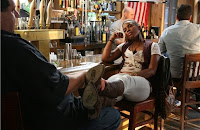 Hungry ghosts refers to a concept in Eastern religions for dead people who cannot say farewell to the living. The term is often a metaphor for people who do not realise that it is increasingly painful and difficult to find happiness if they continue to believe in their illusions. In this feature début by actor Michael Imperioli, his characters float as spirits through life, looking for happiness, looking for the fulfilment of a desire. Imperioli has been an actor in, and scriptwriter for, The Sopranos and played in more than 30 films, including ones by Spike Lee and Martin Scorsese.
Hungry ghosts refers to a concept in Eastern religions for dead people who cannot say farewell to the living. The term is often a metaphor for people who do not realise that it is increasingly painful and difficult to find happiness if they continue to believe in their illusions. In this feature début by actor Michael Imperioli, his characters float as spirits through life, looking for happiness, looking for the fulfilment of a desire. Imperioli has been an actor in, and scriptwriter for, The Sopranos and played in more than 30 films, including ones by Spike Lee and Martin Scorsese.In The Hungry Ghosts, several narrative lines run together. There's a rundown radio presenter (a beautiful role by Steve Schirripa, also from The Sopranos) who keeps on his feet using drink and pills and quarrels with his ex-wife on the phone about their son who has gone off the rails. There's a young woman who is fleeing her life and visits girlfriends and ex-boyfriends looking for a place to sleep. In the course of the film, set in and around New York in the period of 36 hours, it becomes clear and inevitable that the narrative lines will come together. The film is reminiscent of the best TV dramas, thanks to the subtle directing of the actors, the rapid sketching of situations in a character's life and the creation of space through clever moments of non-activity.
Flashbacks of a Fool (UK 114')
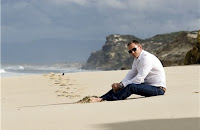 The story starts as the mess is cleared from the luxury beach mansion of Hollywood actor Joe Scott, in whom we recognise the present James Bond actor Daniel Craig. But this is a different kettle of fish. Scott is on the bottle, squabbles with his housemate about a mutt she's picked up and that he regards as too much of a pansy and during lunch he's dumped by his arrogant agent.
The story starts as the mess is cleared from the luxury beach mansion of Hollywood actor Joe Scott, in whom we recognise the present James Bond actor Daniel Craig. But this is a different kettle of fish. Scott is on the bottle, squabbles with his housemate about a mutt she's picked up and that he regards as too much of a pansy and during lunch he's dumped by his arrogant agent.Then he walks into the sea and the story goes back in time to the 1970s, to the East Coast of the USA. A girlfriend introduces the young Scott (Harry Eden) to the world of David Bowie and Bryan Ferry. But the energetic seductive art of the mother of his best friend throw a shadow over this tender love.
Schattenwelt (Long Shadows) (DE 91')
 Long Shadows starts with the early release of the RAF terrorist Widmer, who has to find his way in a changed German society after 22 years in jail. Sentenced for the murder of a businessman and his gardener, he bears the burden of a heavy political heritage. He gets an apartment beside another client of his lawyer, the young Valerie, whose son has been taken into care because of a single case of abuse by his mother. The two do not seem to be more than average neighbours, but their first encounters quickly make one suspect a different scenario.
Long Shadows starts with the early release of the RAF terrorist Widmer, who has to find his way in a changed German society after 22 years in jail. Sentenced for the murder of a businessman and his gardener, he bears the burden of a heavy political heritage. He gets an apartment beside another client of his lawyer, the young Valerie, whose son has been taken into care because of a single case of abuse by his mother. The two do not seem to be more than average neighbours, but their first encounters quickly make one suspect a different scenario.Long Shadows is not another classic RAF drama, but focuses without idealisation or sentimentality on the scars left by the deeds of the RAF on the second and third-generation victims. The composed rhythm of the film hides the complex psychology of a young woman who wants to avenge the death of her father and the desire of a terrorist to see his son, with whom he has never had contact since his detention. The director increasingly allows their worlds and those of the lawyer and an investigator to become entangled, until there's a new and violent climax with another innocent victim. Guilt, revenge and liberation acquire an under-cooled layer in Long Shadows that, told chronologically, keeps adopting new, unpredictable dimensions right up to the end.
Pandora's Box (TR 112')
 Nusret’s adult children - daughters Nesrin, Güzin and son Mehmet - live separate lives in Istanbul and have all come to terms differently with the monotonous void in their urban existence. After hearing that their mother is not well, they trek to their hometown near the Black Sea. Finding Nusret unconscious yet physically fit, they take her back to Istanbul, the city that Ustaoglu regards as a 'Pandora's Box'. The burdensome situation reawakens old conflicts between the siblings. They quickly notice that Nusret is suffering from Alzheimer’s. Nesrin and Güzin first take care of their mother. But the task proves to be too difficult for the quarrelsome sisters: they not only can’t cope with their mother’s decline, they can’t deal with their own alienated lives. The headstrong Nusret abhors the concrete city with its insincere modern relationships and just wants to return home. But unexpectedly she forms a close bond with her rebellious pothead grandson Murat. The film is a profound study of loss, estrangement and familial tensions, but above all it is a critique of a contemporary society that has de-familiarized itself from its roots, its 'Mother Nature'. Pandora’s Box won several prizes in 2008, including the San Sebastian Best Actress Award for protagonist Tsilla Chelton (1918).
Nusret’s adult children - daughters Nesrin, Güzin and son Mehmet - live separate lives in Istanbul and have all come to terms differently with the monotonous void in their urban existence. After hearing that their mother is not well, they trek to their hometown near the Black Sea. Finding Nusret unconscious yet physically fit, they take her back to Istanbul, the city that Ustaoglu regards as a 'Pandora's Box'. The burdensome situation reawakens old conflicts between the siblings. They quickly notice that Nusret is suffering from Alzheimer’s. Nesrin and Güzin first take care of their mother. But the task proves to be too difficult for the quarrelsome sisters: they not only can’t cope with their mother’s decline, they can’t deal with their own alienated lives. The headstrong Nusret abhors the concrete city with its insincere modern relationships and just wants to return home. But unexpectedly she forms a close bond with her rebellious pothead grandson Murat. The film is a profound study of loss, estrangement and familial tensions, but above all it is a critique of a contemporary society that has de-familiarized itself from its roots, its 'Mother Nature'. Pandora’s Box won several prizes in 2008, including the San Sebastian Best Actress Award for protagonist Tsilla Chelton (1918).Der Architekt (DE 93')
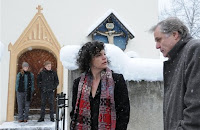 When architect Georg Winter accepts a prize, he explains that an architect has the good fortune of measuring every realised building against the rightness of his original idea. Which also reveals the theoretical framework of Ina Weisse's feature début about a middle-age man who is forced to take stock of the achievements and mistakes he has made in his personal life.
When architect Georg Winter accepts a prize, he explains that an architect has the good fortune of measuring every realised building against the rightness of his original idea. Which also reveals the theoretical framework of Ina Weisse's feature début about a middle-age man who is forced to take stock of the achievements and mistakes he has made in his personal life.Der Architekt is an intense drama in which the four members of the family travel to a mountain village to bury Georg Winter's mother. They get stranded in bad weather. In this unexpected isolation, several proverbial skeletons emerge from the cupboard to throw new light on the past but also on the present life of the parents and the two almost-adult children.
Weisse's first feature has many classic aspects but also allows the actors to leave the beaten path. The smooth surface of the model family hides sexual intrigues and unhealthy dependencies. Weisse plays these beautifully against each other in charged scenes in which the characters do not as much reveal factual details as psychological characteristics. Against the background of the virgin white winter landscape of the Tirol, the director repeatedly adds new accents to bring to the surface unfulfilled desires, falsely agreed compromises and profound insecurities. Choices must be made. The only question is: who's going to make them?
Delta (HU/DE 92')
 Made by a hungarian filmmaker and set in the beauty of the delta of the river Danube, this is an exceptional movie about intolerance and hate . A young man comes to the village where his mother lives with her new lover and his sister, that he hadn't seen for many years. The moment the man meets his sister you see that the two of them have a kind of understanding, while at the same time the new partner of his mother doesn't like him. The son decides to live in the old fishing hut of his father and to built a house of his own at that spot. After a fight between the new partner of the mother and and his sister in which stepfather rapes his stepdaughter, she runs off to live with her brother. The family and villagers don't accept that and the tension rises to a climax.
Made by a hungarian filmmaker and set in the beauty of the delta of the river Danube, this is an exceptional movie about intolerance and hate . A young man comes to the village where his mother lives with her new lover and his sister, that he hadn't seen for many years. The moment the man meets his sister you see that the two of them have a kind of understanding, while at the same time the new partner of his mother doesn't like him. The son decides to live in the old fishing hut of his father and to built a house of his own at that spot. After a fight between the new partner of the mother and and his sister in which stepfather rapes his stepdaughter, she runs off to live with her brother. The family and villagers don't accept that and the tension rises to a climax.Of course I don't feel ashamed by anything (not true). Well, have fun at my expense.











